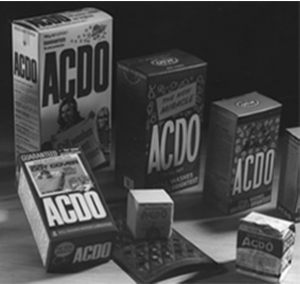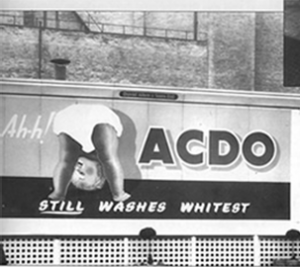

Life had not been easy for Harry Pilling, born in Bolton in 1903. The carefree days of childhood were cut short by the premature death of his father when the boy was only twelve and it soon dawned on Harry, an only child, that he would have to adopt the mantle of breadwinner, and as soon as possible. So, on his 16th birthday Harry started his own import/export business in 1919, The Astley Dye & Chemical Company in Astley Bridge, Bolton. And the ACDO company was born!
Harry’s first venture into international commerce was an unmitigated disaster, and so looking around for a more saleable commodity, the first line ever produced by ACDO was a soap known as XL. However, Harry enjoyed a particularly fortunate stroke of luck. He found a chemical called Sodium Perborate, which he mixed and packaged as “Adco”, (but quickly re-named it Acdo).
Acdo was to revolutionise washdays. The Acdo tablet was shredded into water with a grater, and added to an equal amount of shredded soap. The result was a wash that required no rubbing or scrubbing to remove stubborn stains. The Sodium Perborate helped to lift out the dirt, and, as the bubbles contained oxygen, a mild bleaching effect was also obtained. The end result – a wash that could be completed in 20 minutes without the hard
work, little wonder that Harry’s first advertising slogan was that “Acdo makes washday a holiday!”. Church and school halls were booked for washing demonstrations, and housewives were invited to bring articles for washing. On the retail front, local grocers were also offered boxes of Acdo on sale or return to cope with the ever increasing demand.
At this stage, the company comprised only Harry and his mother, who were still preparing and packaging the soap entirely unaided on their kitchen table but demand soon reached a level whereby the modest production facilities afforded by a little terrace house could no longer cope and, in 1921 Harry purchased an ex-army tin Nissan Bow hut located nearby and four staff were hired to help with production. The business took off and moved into a wooden building, and the staff count rose to 10 and sales people/agents were taken on to spread the news of ACDO to more distant parts of Lancashire and over the Pennines to Yorkshire.
In 1928 and at the age of 25 Harry moved in to custom-built premises in Mallison Street, Bolton and these remain as the company’s head office to this day, albeit in a very changed and greatly extended form. The 10 years from 1928 to 1938 saw phenomenal growth at ACDO, but the clouds of conflict gathered over Europe and, by 1939; the country was once again at war.


But with the war over in 1945, ACDO expected an upturn in business, but even the introduction in 1948 of powdered ACDO did not prove to be the goldmine that it might have been, and with the end of soap rationing the demand for CLEBO dropped dramatically. However in 1949, Harry’s son Marshall, now 19, joined the company.


Marshall worked his way through the ranks starting as a machine operator. By the early 50′s Marshall had moved from the shopfloor to the sales office where he oversaw all the firm’s promotional and packaging activities. His success led to him being promoted to Sales Director and then on to Managing Director, at the age of 26. And it was shortly after this that ACDO introduced another product to their range, GLO WHITE fabric whitener.
Marshall realised that business would not just come to ACDO and so in 1958, he mustered all the money the company had and ploughed everything into making a TV commercial. By 1959 the business was back on its feet, and trade was so good that a night shift was again added.
This led to the advent of the Gift Department, an innovative business and loyalty building scheme where customers collected box tops, sent these in to the factory and received a gift in return. The Gift Department became exceptionally busy and in its heyday in the 1970′s, its nine staff were dispatching over 5000 gifts per week.

ACDO continued to advertise on TV and the product was being sold from Yorkshire to Lancashire, and the Midlands up to Scotland. ACDO had no less than 16 agents permanently on the road. However, the heyday was to end around 1969 with the advent of a new product, Ariel. Using a technique of which even Harry and Marshall had grudging admiration, over 20 million samples were door dropped over a matter of weeks and such was the instant popularity of this new washing powder that Ariel gained a phenomenal 33% market share before its competitors, including ACDO, had recovered from the shock.



The 1970′s proved to be another difficult decade for Marshall and ACDO. Biological products continued to erode the trade for conventional powders, as did the consumer attitude shift towards lower temperature washing. Front loading machines had come to the market which were designed to operate at the new, lower temperatures and though original Acdo was still unchallenged as the best powder for the high temperature washes of twin tubs, it simply was not suitable for front loaders. Also, for many years, Acdo had been the detergent of choice for washing nappies, but the 1970′s saw the arrival of disposable nappies and as the popularity of these grew, the demand for ACDO declined.In 1974 Marshall hired a Marketing and Sales Director called Tony Isbell, whose whole career had been in selling who laid the groundwork for a new selling approach, and as new salesmen were put on the ground and, more professional selling techniques introduced, slowly trade began to back up. But the company was still too reliant on one product, the company started to concentrate efforts on Glo White – which at this stage was a one product fabric whitening opportunity.The original hand wash product was re-launched as a Wash Booster which as a ‘whites enhancer’ could be added to wash cycle. In one clever move, Glo White had been repositioned from being an occasional use niche product into a regularly used mainstream one. And a research programme revealed that the product was used to whiten their net curtains, and so technical people were sent to work and a new formulated Glo White product was launched that would bring the net curtains back to their ‘just bought’ whiteness and keeping them that way.
The product was unique, and a huge success and remains one of the company’s best sellers to this day and gave the company its first truly national line.
 The 1980′s were a successful decade, and the time was ripe for a third generation of Pillings to enter the company, however, there were no automatic jobs for them.
The 1980′s were a successful decade, and the time was ripe for a third generation of Pillings to enter the company, however, there were no automatic jobs for them.At age 17, Marshall’s third child, Brandon, took holiday work at ACDO mixing the ingredients for Acdo before going off to Art College, and then to Design school to complete a BA (Hons) degree in Design. And after having found work in design, Brandon became involved in marketing, and in 1985 at the age of 23 came to a decision to join the family firm, if his father would have him!
He was soon to be joined by Marshall’s fourth child David, who also joined the company in the 1980′s.
Brandon had trained in product design and his talents in this sphere proved useful to the company at a time when its range was rapidly expanding. The 80′s saw the introduction of various new products and in 1989 Brandon was appointed as Marketing Director and his first major decision was to move product innovation away from launching new ‘Acdo’ products and to concentrate on creating a ‘Glo’ umbrella brand. And with the launch of a new stain remover the start of a ‘Glo’ revolution commenced. The result was that, before long, ACDO became the clear market leader in additives with a 35% share and for cohesion, all wash additives were repackaged into a corporate Glo.



ACDO continued to develop and find new and challenging products like Colour Catcher, which is a godsend if a rogue red sock is inadvertently included in the ‘whites’ wash.
Acquisition was another hallmark of the 1990′s and to expand their production capability, ACDO purchased the Brightmill Chemical Company of Little Lever, Bolton in December 1998. The plant was heavily involved with janitorial and contract detergents and with over 500 products on its books, from bleach to machine dishwash, to surface cleaners, and floor cleaners, the range of products was vast.
In 1999, it was decided to resolve the dichotomy between ACDO the manufacturer of products, ACDO the trading and distribution specialist, and Acdo the brand and to create a new name for the company’s latter interests. To maintain the heritage of the business, for simplicity and for memorability, the name that was chosen was ACDOCO.
![]()


However, diversification remained still high on the agenda, and 2000 saw the launch of a new strategic alliance with Italian company Coswell to launch specialist personal care items into the U.K. market, initially as a range of aluminium-free deodorants called Bionsen, and later tooth-whitening products under the trademark Blanx.
With the distribution business expanding, partner business growing, and international business increasing, ACDOCO began to outgrow its premises at Astley Bridge despite extending buildings in every direction.
In 2003 a decision was made to move warehousing and distribution to Blackburn, effectively splitting the company into a manufacturing unit at the original premises in Astley Bridge and a dedicated distribution centre at its offices in Mill Hill in Blackburn.
The following years saw the company grow and invest heavily in a market dominated by the retail giants. The need to be a bigger company with ever more critical mass became the focus for that period of time, in turn stimulating an ever-greater focus on the need for new product development and innovation.
Then in 2007 a very significant decision was made to formalise the strategic partnership with Delta Pronatura, to ensure that it continued to grow and remain successful. Seeing the need to be a part of a larger European-wide structure rather than operating in the UK in isolation, the decision was made for delta Pronatura to acquire a majority share in the commercial business of ACDOCO, now based at Blackburn and a new dawn broke. ‘New ACDOCO’ is a UK only focused business trading in the specialist areas in laundry and household care, under the Dr Beckmann, whilst also acting as a distributor for Acdo branded items and also on behalf of companies in specialist personal care areas.
This company operates under its new board of Directors of Heiner Beckmann (Chairman), Brandon Pilling, Gerhard Krauss and Arthur Baker. The Directors remain just as committed to ensuring that this family company remains a family company to ensure that the rich history of both companies is maintained and built on for the future
BUILDING FOR THE FUTURE
In 2013, Acdoco relocated its commercial operations to a business centre in West Manchester. The new facilities provide purpose built office accommodation and warehousing hub, from where it delivers to all its retail partner.
